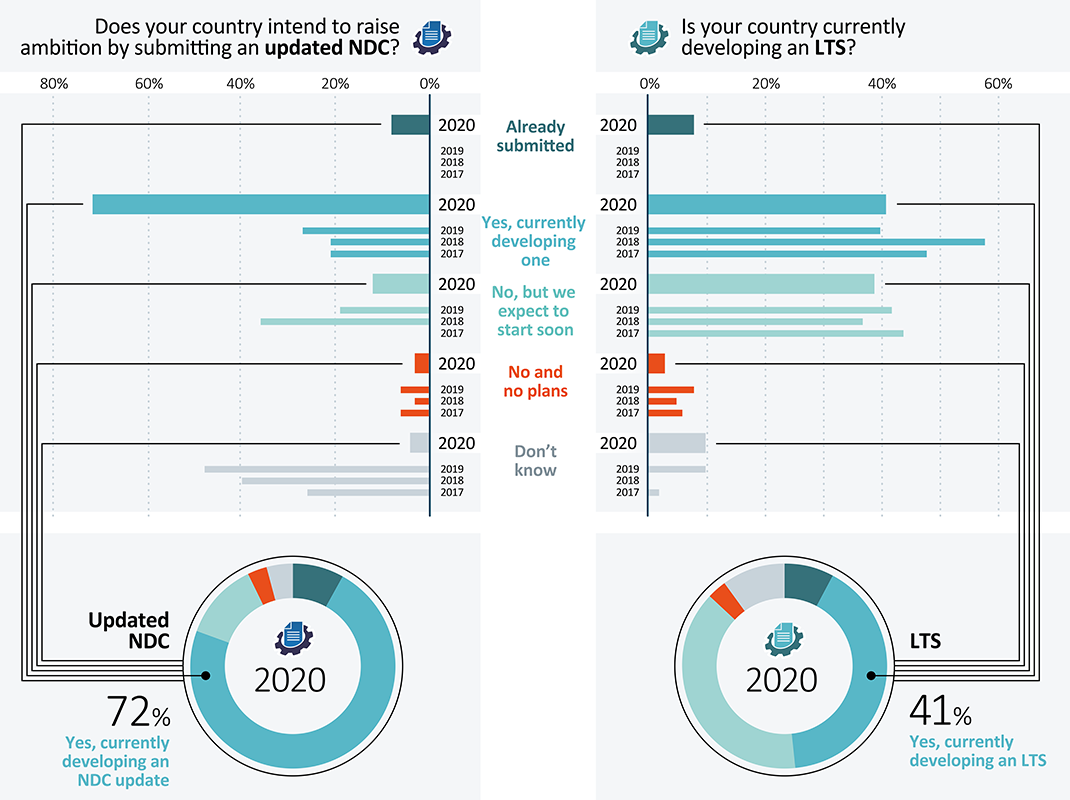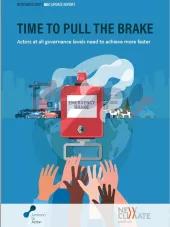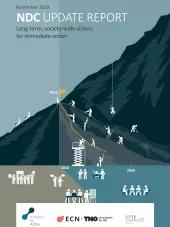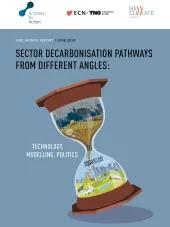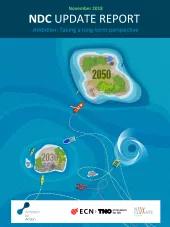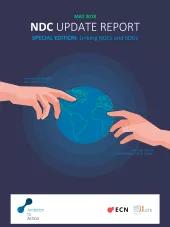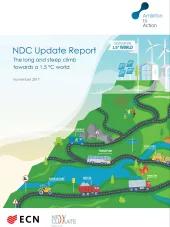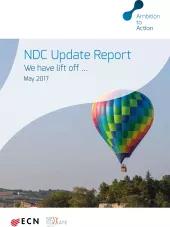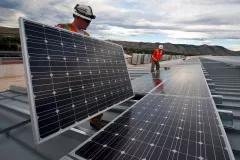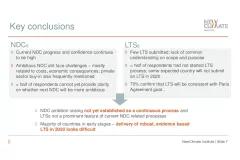The 2020 NDC Update report discusses countries’ preparedness to ratchet up ambition in the first NDC update cycle amidst a global health crisis. Based on our survey of 98 policy makers and experts involved in NDC planning and implementation from 83 countries, we discuss the progress of NDC implementation since 2015, expectations for the NDC update cycle, and progress on the development of Long-term Low Greenhouse Gas Emission Development Strategies (LTSs). We analyse the potential impact of COVID-19 on climate planning and climate action with regards to the future of clean technologies, the national climate agenda and mitigation pathways.
Five years since the Paris Agreement: Time for serious commitment
2020 has been an unexpected year. The climate crisis was overshadowed by the global health crisis and addressing it is more urgent than ever. On the other hand we also see reasons for optimism. Fundamental transition drivers remain intact, there has been a build-up of civil society pressure gaining traction, and several of the world’s leaders have committed to taking serious action. To keep the momentum, and guide it in the direction of higher climate ambition, 2021 is the year we have to come together and act decisively.
2020 marks five years since the Paris Agreement, and the NDC update cycle provides the opportunity to register a turning point in raising ambition for climate change mitigation. Several serious and consolidated strategies for climate change action are emerging, but processes are delayed and it is unlikely that climate commitments in 2020 will match the required urgency for climate action. The window of opportunity for re-orienting the global economy toward netzero emissions, in line with the goal of the Paris Agreement, is closing. It remains unclear whether the current NDC update cycle will deliver a significant increase in ambition, but we find that too many countries do not currently plan to do so.
While there are several positive examples of countries that have been able to credibly inform the ambition level of their updated NDCs through the consolidation of the NDC and LTS processes, many countries have faced severe delays with the preparation of their LTSs and have missed this opportunity; the process of LTS development appears to have been broadly underestimated.
It is not too late – enhanced climate ambition by COP26 is crucial. Amidst the global COVID-19 crisis, delays to the processes of NDC and LTS finalisation are inevitable and the dash for submission should not come at the expense of quality with regards to ambition.
Based on the NDC survey undertaken during August-September 2020.
Ambition and action in times of COVID-19
The majority of respondents remains optimistic about the drivers behind climate action, but less so about the impact of the COVID-19 crisis on their countries’ climate policy and ambitions. Some see this moment as an ideal opportunity to give the low-carbon transition a push, for example with strong green stimulus, while others are severely constrained in their policy options and require support.
Climate is in the spotlight, but short-term relief goes first. Green stimulus measures are being discussed and decided on, investments in fossil fuel industries are becoming increasingly risky, and the restrictive measures followed by citizens in countries around the world to mitigate the pandemic show that quite radical behavioural change is possible. However, the current crisis reorients the political compass towards short term spending, leads to less available public budget in the medium term and puts at risk much needed structural change through the bailing out of polluting businesses (such as aviation or mining) most often without climate related conditions.
A number of countries, especially in the developed world, will be able to buffer the economic shocks caused by the current crisis, accelerate the clean transformation, and even become strong players in the new clean technology markets. Despite attractive calls to ‘build back better’, for many developing countries the reality will be one of fragile supply chains, reduced liquidity, and increased debt. Depending on what the ‘new normal’ is going to look like, some countries will need to face significant economic restructuring, none of which is currently reflected in the projections of NDCs.
Based on the NDC survey undertaken during August-September 2020.
Come together
The sense of optimism from our respondents could be an indication that positive developments are around the corner but it could also be a sign that there may be a mismatch of expectations. There is still time to act but the window of opportunity for adequate ambition raising does not allow to wait until the next NDC update cycle in 2025, at which point the scale of the task may be beyond reasonable reach. We urge Parties not to wait until the next NDC update cycle in 2025 to correct the lack of ambition. The global COVID-19 pandemic has brought disruptions to the quality of climate planning processes and NDCs in 2020, but countries are likely to find themselves in a position of more clarity and confidence as they emerge from the crisis in the next years. The revival of active multilateralism should be seized by ambitious countries to act now, even if outside of the formal NDC update cycles, to communicate new commitments that reflect their highest possible ambition, and to rally and support others to follow their lead.
Perspectives on the impact of COVID-19 on climate action
Meeting the global temperature goal of the Paris Agreement will require efforts by all stakeholders and from all countries. We asked guest contributors to share their perspective on the impact of COVID-19 on climate action and reaching the goal of the Paris Agreement. Guest contributions in section 4 cover NDC processes (NDC Partnership), the vulnerability of small islands developing states (Climate Analytics), challenges for ambition in developing countries (SouthSouthNorth), disruptions to agri-food systems (FAO), the role of civil society and stakeholder engagement (BUND) and the importance of transparency in recovery measures (World Resources Institute).

